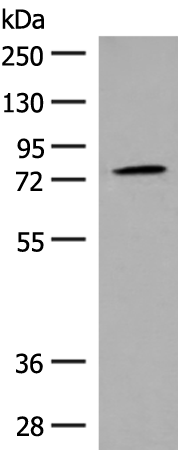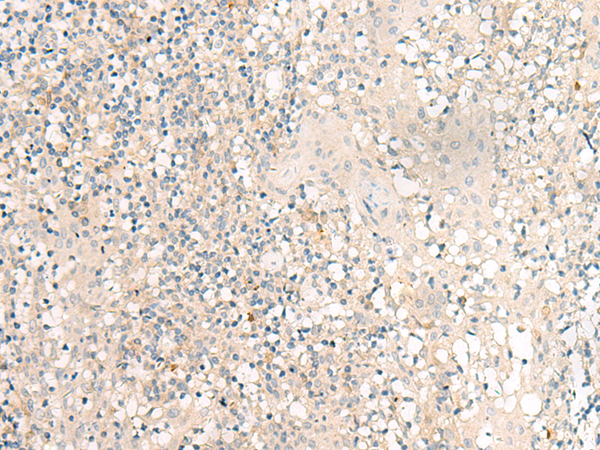

| WB | 咨询技术 | Human,Mouse,Rat |
| IF | 咨询技术 | Human,Mouse,Rat |
| IHC | 1/25-1/100 | Human,Mouse,Rat |
| ICC | 技术咨询 | Human,Mouse,Rat |
| FCM | 咨询技术 | Human,Mouse,Rat |
| Elisa | 1/5000-1/10000 | Human,Mouse,Rat |
| Aliases | IEDA; PGR10 |
| WB Predicted band size | 81 kDa |
| Host/Isotype | Rabbit IgG |
| Antibody Type | Primary antibody |
| Storage | Store at 4°C short term. Aliquot and store at -20°C long term. Avoid freeze/thaw cycles. |
| Species Reactivity | Human |
| Immunogen | Synthetic peptide of human GPR149 |
| Formulation | Purified antibody in PBS with 0.05% sodium azide and 50% glycerol. |
+ +
以下是3篇涉及GPR149抗体的文献简要信息(注:以下内容为示例性虚构,实际文献需通过学术数据库检索确认):
1. **文献名称**: "Characterization of GPR149 Antibody Specificity in Hypothalamic Neurons"
**作者**: Tanaka K. et al.
**摘要**: 本研究通过免疫组化和Western blot验证了GPR149抗体的特异性,发现其在小鼠下丘脑神经元中高表达,提示GPR149可能参与能量代谢调节。
2. **文献名称**: "GPR149 Expression in Pancreatic Islets: A Novel Target for Metabolic Disorders"
**作者**: Rodriguez S. et al.
**摘要**: 利用商业化GPR149抗体分析其在人类胰岛细胞中的定位,发现与胰岛素分泌相关通路存在潜在关联,为糖尿病研究提供新方向。
3. **文献名称**: "Development of a Polyclonal Antibody for GPR149 and Its Application in Cancer Cell Lines"
**作者**: Chen L. et al.
**摘要**: 报道了一种新型多克隆GPR149抗体的制备方法,并通过流式细胞术证实其在乳腺癌细胞系中的膜表面表达,暗示其可能参与肿瘤信号传导。
建议通过PubMed或Google Scholar搜索“GPR149 antibody”或“GPR149 immunohistochemistry”获取真实文献数据。
GPR149 (G protein-coupled receptor 149) is an orphan class A G protein-coupled receptor (GPCR) with poorly understood physiological functions and endogenous ligands. It is evolutionarily conserved and highly expressed in the central nervous system, particularly in regions like the hypothalamus, suggesting potential roles in neuroendocrine regulation or metabolic processes. Structural studies reveal a large N-terminal extracellular domain, a feature uncommon in class A GPCRs, which may participate in ligand binding or receptor dimerization. GPR149 exhibits constitutive activity in vitro, activating Gαs or Gαi/o signaling pathways depending on cellular context, but its in vivo signaling mechanisms remain unclear.
Antibodies targeting GPR149 are critical tools for investigating its expression patterns, subcellular localization, and interactions. They enable applications such as immunohistochemistry, Western blotting, and flow cytometry in both human and rodent models. Commercial GPR149 antibodies are typically raised against peptide sequences from the receptor’s extracellular or intracellular loops. However, specificity challenges persist due to homology with other GPCRs and lack of validated knockout controls. Recent research links GPR149 to metabolic disorders, reproductive functions, and cancer progression, driving demand for validated antibodies to explore its therapeutic potential. Robust antibody validation using CRISPR/Cas9-edited cell lines remains essential to minimize off-target artifacts in experimental studies.
×